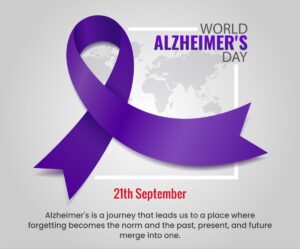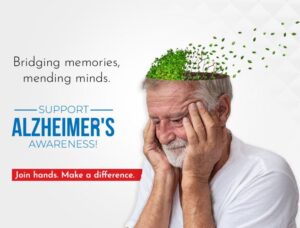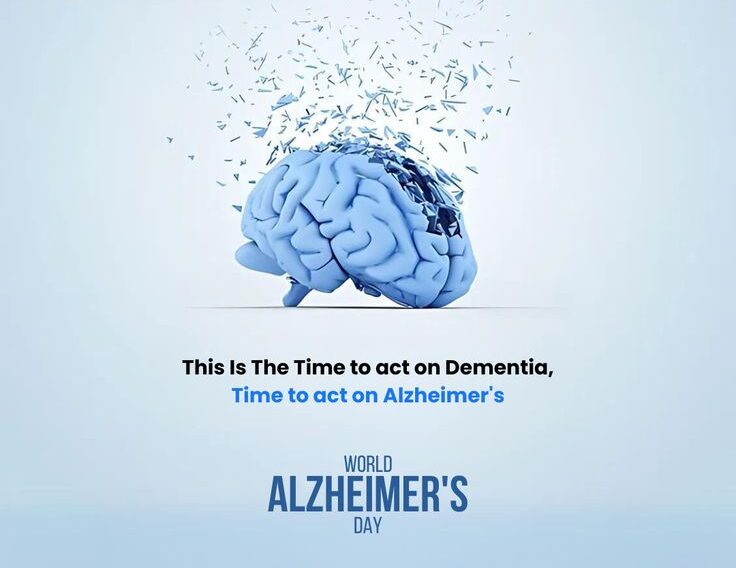🌍 Introduction: Why World Alzheimer’s Day Matters Deeply
In the quiet corners of millions of homes around the globe, there’s a disease that slowly erases names, faces, and memories — Alzheimer’s. It doesn’t just affect the mind of the patient but tears through the emotional fabric of entire families. World Alzheimer’s Day, observed every 21st September, is more than a health awareness day — it’s a global plea for empathy, research, and recognition.
- 🌍 Introduction: Why World Alzheimer’s Day Matters Deeply
- 🗓️ History of World Alzheimer’s Day
- 📌 Timeline of Key Milestones
- 🔍 7 Shocking Truths About Alzheimer’s Disease
- 🧠 What is Alzheimer’s Disease?
- 💡 Important Facts About Alzheimer’s
- ❓ FAQs About World Alzheimer’s Day
- 🕊️ Observance of World Alzheimer’s Day
- ❤️ Human Connection: Daily Life and Impact
- 💬 Wishing Messages for World Alzheimer’s Day
- 🎯 Why It’s Important in Life and Society
- ✅ Key Takeaways
- 🧩 Conclusion: Don’t Forget to Remember
This article sheds light on the deep significance of World Alzheimer’s Day, with a human touch, covering its history, timeline, facts, observance, and its impact on our daily lives.
🗓️ History of World Alzheimer’s Day
World Alzheimer’s Day was first launched on 21 September 1994 by Alzheimer’s Disease International (ADI) to mark the 10th anniversary of the organization. It was born out of the need to bring global attention to the disease that many either ignored or misunderstood.
In 2012, ADI declared September as World Alzheimer’s Month, amplifying efforts to remove stigma and enhance awareness.
The day also commemorates Dr. Alois Alzheimer, the German psychiatrist and neurologist who first identified the disease in 1906.

📌 Timeline of Key Milestones
| Year | Event |
|---|---|
| 1906 | Dr. Alois Alzheimer identifies the first case of the disease. |
| 1984 | Alzheimer’s Disease International (ADI) is founded. |
| 1994 | First World Alzheimer’s Day is observed on Sept 21. |
| 2012 | World Alzheimer’s Month is launched for all of September. |
| 2020 | Global awareness campaigns surge during COVID-19 due to increased isolation. |
| Today | Observed in over 100+ countries with walks, memory cafes, and educational seminars. |
🔍 7 Shocking Truths About Alzheimer’s Disease
❗ A New Case Every 3 Seconds
Globally, someone develops dementia every 3 seconds. Alzheimer’s is the most common form — accounting for 60-70% of all dementia cases.❗ Over 55 Million People Affected Worldwide
According to the World Health Organization, over 55 million people currently live with dementia — a number expected to triple by 2050.❗ It’s Not Just “Old Age”
Alzheimer’s is not a normal part of aging. It’s a neurodegenerative disease that damages memory, reasoning, language, and eventually, physical function.❗ Early Symptoms Are Often Ignored
Many families overlook early signs like forgetfulness, misplacing items, and language issues, delaying crucial diagnosis and care.❗ It’s Emotionally and Financially Draining
Alzheimer’s affects caregivers deeply. Studies show family caregivers suffer higher levels of stress, depression, and financial burden.❗ No Cure Yet Exists
Despite massive research, no cure has been found yet. Current treatments only manage symptoms and slow progression.❗ Stigma Still Surrounds It
Many cultures hide the diagnosis due to shame or misunderstanding, leading to isolation and lack of proper care.
🧠 What is Alzheimer’s Disease?
Alzheimer’s is a progressive neurological disorder that causes brain cells to degenerate and die. This leads to a continuous decline in thinking, behavioral and social skills, affecting a person’s ability to function independently.
Common Symptoms:
Memory loss disrupting daily life
Challenges in problem-solving or planning
Confusion with time or place
Misplacing things
Mood swings, withdrawal, or personality changes
💡 Important Facts About Alzheimer’s
🧬 Alzheimer’s is linked to the build-up of plaques (beta-amyloid) and tangles (tau protein) in the brain.
🧓 It mostly affects people above 65, but early-onset Alzheimer’s can start as early as 40.
🌍 It’s the 7th leading cause of death worldwide.
🧪 Regular physical activity, a healthy diet, mental stimulation, and social interaction can help lower risks.
🧭 Countries like the Netherlands and Japan lead in dementia-friendly initiatives.
❓ FAQs About World Alzheimer’s Day
Q1. What is the aim of World Alzheimer’s Day?
To raise awareness, fight stigma, and promote support for people living with dementia and their caregivers.
Q2. Is there a theme for World Alzheimer’s Day?
Yes, each year ADI declares a theme. For example, 2024’s theme was “Never too early, never too late”, focusing on proactive brain health.
Q3. How is Alzheimer’s different from normal aging?
While aging may cause slower recall, Alzheimer’s causes memory loss that disrupts life and personality, not just forgetfulness.
Q4. Can Alzheimer’s be prevented?
There’s no guaranteed prevention, but brain-healthy habits like exercise, learning new skills, and good sleep reduce risks.
Q5. How can I support someone with Alzheimer’s?
Be patient, reassure them, maintain a routine, speak clearly, and avoid correcting them unnecessarily.
🕊️ Observance of World Alzheimer’s Day
The day is marked globally with:
🧠 Memory walks and marathons
🏥 Free memory screening clinics
📚 Awareness seminars, school projects, and webinars
🕯️ Candlelight vigils for those who’ve passed
💜 Wearing purple, the color of Alzheimer’s awareness
📱 Online campaigns using hashtags like #WorldAlzheimersDay, #EndAlz, and #KnowDementia

❤️ Human Connection: Daily Life and Impact
Behind every diagnosis is a story — a father forgetting his daughter’s name, a grandmother lost in her own home, a spouse mourning someone still alive.
This disease challenges love, identity, and patience. It teaches caregivers unseen strength, and forces us to redefine connection beyond language or logic.
Daily impact includes:
🍴 Loss of independence in eating, dressing, hygiene
🧭 Confusion in familiar environments
😔 Emotional isolation, paranoia, and anxiety
🧓 Dependence on caregivers for even basic needs
💸 High healthcare costs and mental burnout
💬 Wishing Messages for World Alzheimer’s Day
Here are some thoughtful lines you can share:
“Let’s remember those who forget — raise awareness this World Alzheimer’s Day.”
“Empathy is the best medicine we can offer. Support Alzheimer’s awareness today.”
“Forget-me-not — not just a flower, but a promise to those living with Alzheimer’s.”
“Let’s light a candle, start a conversation, and end the silence around Alzheimer’s.”
“Every memory matters. Every life matters. Let’s fight Alzheimer’s together.”
🎯 Why It’s Important in Life and Society
🧠 Alzheimer’s affects every family, directly or indirectly.
🏥 Public health systems must prepare for the dementia tsunami ahead.
🧑⚕️ Caregiver training, dementia-friendly policies, and early detection must become priorities.
🌎 Awareness leads to compassion. Understanding the disease reduces stigma, increases early diagnosis, and improves care.
Just as we care for our children, we must care for our elders with dignity — because memory is not just personal, it’s cultural.
✅ Key Takeaways
🌐 World Alzheimer’s Day is observed every year on 21st September.
📖 Started in 1994 by Alzheimer’s Disease International (ADI).
📊 Over 55 million people live with dementia today.
💔 No cure yet, but lifestyle changes may reduce risk.
💜 Campaigns focus on awareness, empathy, and support.
🧩 Conclusion: Don’t Forget to Remember
World Alzheimer’s Day is not just for the affected. It’s for everyone with a memory. It’s a reminder to value our elders, to invest in mental health, and to build a society where forgetting is not shameful but supported.
Let’s not wait until someone we love forgets who we are.
🕯️ Light a candle. Learn the signs. Share your voice. Because Alzheimer’s doesn’t wait — and neither should we.








